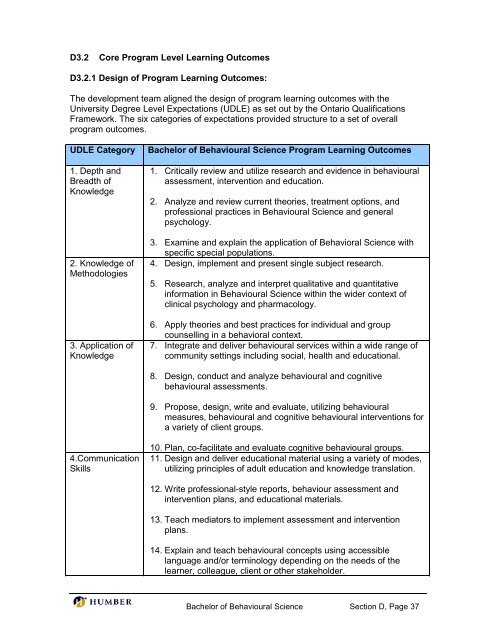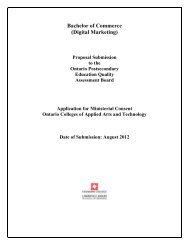Bachelor of Behavioural Science - Postsecondary Education Quality ...
Bachelor of Behavioural Science - Postsecondary Education Quality ...
Bachelor of Behavioural Science - Postsecondary Education Quality ...
Create successful ePaper yourself
Turn your PDF publications into a flip-book with our unique Google optimized e-Paper software.
D3.2 Core Program Level Learning Outcomes<br />
D3.2.1 Design <strong>of</strong> Program Learning Outcomes:<br />
The development team aligned the design <strong>of</strong> program learning outcomes with the<br />
University Degree Level Expectations (UDLE) as set out by the Ontario Qualifications<br />
Framework. The six categories <strong>of</strong> expectations provided structure to a set <strong>of</strong> overall<br />
program outcomes.<br />
UDLE Category<br />
1. Depth and<br />
Breadth <strong>of</strong><br />
Knowledge<br />
2. Knowledge <strong>of</strong><br />
Methodologies<br />
3. Application <strong>of</strong><br />
Knowledge<br />
<strong>Bachelor</strong> <strong>of</strong> <strong>Behavioural</strong> <strong>Science</strong> Program Learning Outcomes<br />
1. Critically review and utilize research and evidence in behavioural<br />
assessment, intervention and education.<br />
2. Analyze and review current theories, treatment options, and<br />
pr<strong>of</strong>essional practices in <strong>Behavioural</strong> <strong>Science</strong> and general<br />
psychology.<br />
3. Examine and explain the application <strong>of</strong> Behavioral <strong>Science</strong> with<br />
specific special populations.<br />
4. Design, implement and present single subject research.<br />
5. Research, analyze and interpret qualitative and quantitative<br />
information in <strong>Behavioural</strong> <strong>Science</strong> within the wider context <strong>of</strong><br />
clinical psychology and pharmacology.<br />
6. Apply theories and best practices for individual and group<br />
counselling in a behavioral context.<br />
7. Integrate and deliver behavioural services within a wide range <strong>of</strong><br />
community settings including social, health and educational.<br />
8. Design, conduct and analyze behavioural and cognitive<br />
behavioural assessments.<br />
9. Propose, design, write and evaluate, utilizing behavioural<br />
measures, behavioural and cognitive behavioural interventions for<br />
a variety <strong>of</strong> client groups.<br />
4.Communication<br />
Skills<br />
10. Plan, co-facilitate and evaluate cognitive behavioural groups.<br />
11. Design and deliver educational material using a variety <strong>of</strong> modes,<br />
utilizing principles <strong>of</strong> adult education and knowledge translation.<br />
12. Write pr<strong>of</strong>essional-style reports, behaviour assessment and<br />
intervention plans, and educational materials.<br />
13. Teach mediators to implement assessment and intervention<br />
plans.<br />
14. Explain and teach behavioural concepts using accessible<br />
language and/or terminology depending on the needs <strong>of</strong> the<br />
learner, colleague, client or other stakeholder.<br />
<strong>Bachelor</strong> <strong>of</strong> <strong>Behavioural</strong> <strong>Science</strong> Section D, Page 37
















